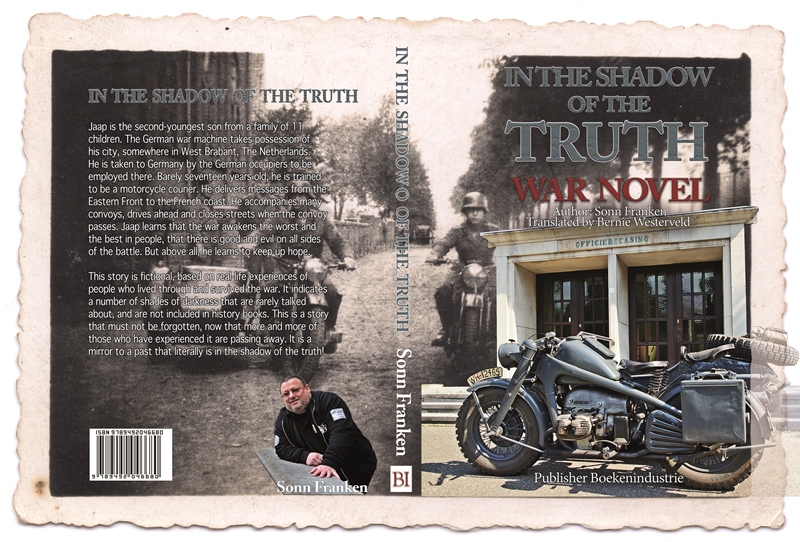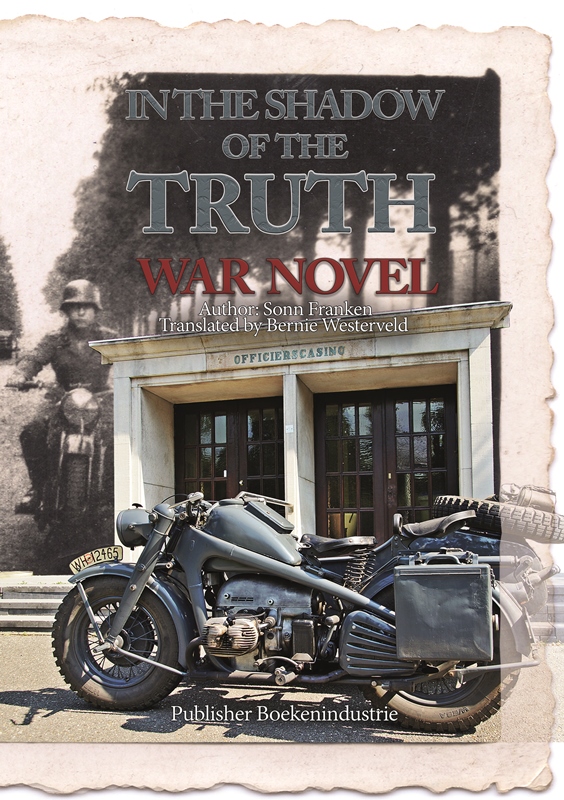Inherited passion: Love for motorcycles
![]()
This article contains two parts:
1. English https://bozinbeeld.nl/media/schadow
2. Dutch, so scroll down https://bozinbeeld.nl/media/schaduw
I've been riding a motorcycle since I was 18. As soon as I could, I got my driver's license for a two-wheeler. In the meantime, I am 60 years young and still ride a motorcycle; a beautiful Indian Scout that I slightly modified. You could say I love motorcycles.
Where does that passion come from, you may ask. In my case, the answer is clear: I got it from my father. He taught me this at a young age. He was also fond of the two-wheelers and was able to tell me a lot about old brands and models, such as a Matchless, Sunbeam, Norton, Zündapp or the BMW R51 racing machine.
There was a reason for my father's inspiration. In the Second World War, as a seventeen-year-old boy, he was taken to Germany by the German occupiers to work for them. He ended up in a camp where he was trained as a motorcycle courier. He transported packages and order letters throughout Germany, but also through countries such as Poland, France, and even as far as Russia.
It was a terribly brutal and inhumane time. But also, a time when he found the love for motorcycling when he could go out on his own and find relaxation between the fields or in the woods.My father made lifelong friends during this period. Simple German peasant people who had suffered as much from the war and the tyranny of the German army, and especially of the SS, as anyone else in the rest of occupied Europe.
After the war he frequently visited these people, it was always a great adventure when we went abroad early on a Saturday morning. When my father got older, I took over as a driver. Several times a year I picked him up at home and we drove to his German friends. I heard the stories the older people had to tell and got to know a completely different side of the war.
Around the liberation celebrations, which are celebrated every year in May in the Netherlands, I noticed less and less attention for human stories. Statistical figures and schedules made for a cold picture. Stories about the Dutch who had been taken to Germany to work for the German war machine were certainly not heard at all. In the history books you only read what the victor has written, so that is always black and white. I decided to record my father's story, as it were “in the shadow of the truth”. I consulted with my mother, and she replied: 'That's good boy, so the story of your father will be preserved'.
And so, the book “In the shadow of the truth” was born. A book based on the stories of those who lived and survived the Second World War. A book in which hope dances with despair, in which inhuman atrocities and beautiful loving moments alternate. It is a window into one of the darkest periods in our history. But for me it is also a book in which the passion and love for motorcycles and motorcycling resounds on all pages; it's my father's story that tells me where my passion for motorcycles comes from.
My dream came true when a German version was released with the title: Im Schatten der Wahrheit. Now I am very proud that an American-English edition is also becoming available internationally: In the Shadow of the Truth available on Amazon.
A short description:
The book is based on the stories of those that have lived these events. It starts in 1940 in the days that the Germans invaded the Netherlands and tells the story of Jaap, a 17-year-old kid, that was abducted from his home with most of his brothers, and was forced to work for the German occupiers. He travels through Germany, Poland, France, trying to balance loyalty to his home country and the Allies, and the German threat to hurt his family if he does not obey orders. It shows the horror of war, bringing out the worst and the best in people, both in friends and enemies.
Geërfde passie: Liefde voor motoren
Dit artikel bevat twee gedeelten:
1. Engelstalig https://bozinbeeld.nl/media/schadow
2. Nederlandstalig https://bozinbeeld.nl/media/schaduw
Al sinds mijn 18e rij ik motor. Zodra ik kon, haalde ik mijn rijbewijs voor een tweewieler. Ondertussen ben ik 60 jaar jong en rij nog steeds motor; een prachtige Indian Scout die ik lichtjes gemodificeerd heb. Je kunt wel zeggen dat ik gek op motoren ben. Waar komt die passie vandaan, kun je je afvragen. In mijn geval is het antwoord duidelijk: die heb ik van mijn vader. Al op jonge leeftijd kreeg ik dit met de paplepel ingegoten door hem. Ook hij was verzot op de tweewielers, en wist me veel te vertellen over oude merken en modellen, zoals een Matchless, Sunbeam, Norton, Zündapp of de BMW R51 racemachine.
Er was een reden voor mijn vaders bezieling. Hij was namelijk in de Tweede Wereld Oorlog als zeventienjarig jongetje door de Duitse bezetter mee naar Duitsland gevoerd om voor hen te werken. Hij belandde in een kamp waar hij werd opgeleid tot motorkoerier. Hij vervoerde pakketjes en orderbrieven door Duitsland, maar ook door landen als Polen, Frankrijk, ja zelfs tot in Rusland. Het was een verschrikkelijke brute en onmenselijke tijd. Maar ook een tijd waarin hij de liefde voor het motorrijden vond als hij in zijn eentje op pad kon en tussen de velden of in de bossen zijn ontspanning kon vinden.
Mijn vader heeft in deze periode vrienden voor het leven gemaakt. Eenvoudige Duitse boerenmensen die net zo onder de oorlog en de tirannie van het Duitse leger, en in het bijzonder van de SS, geleden hadden als wie dan ook in de rest van bezet Europa. Na de oorlog heeft hij veelvuldig deze mensen bezocht, het was altijd een groot avontuur als wij op zaterdagochtend vroeg op pad gingen naar het buitenland. Toen mijn vader ouder werd, nam ik het stokje als chauffeur over. Een aantal keren per jaar pikte ik hem thuis op en reden we naar zijn Duitse vrienden. Ik hoorde de verhalen aan die de oudere mensen te vertellen hadden en leerde zo een hele andere kant van de oorlog kennen.
Rondom de bevrijdingsfeesten, die elk jaar in Nederland in mei gevierd worden, merkte ik steeds minder aandacht voor de menselijke verhalen. Statistische cijfers en schema’s maakten het koude beeld. Verhalen over de Nederlanders die naar Duitsland gevoerd waren om voor de Duitse oorlogsmachine te werken, werden al helemaal niet gehoord. In de geschiedenisboeken lees je alleen wat de overwinnaar geschreven heeft, dat is dus altijd zwart-wit. Ik besloot het verhaal van mijn vader op te tekenen, als het ware “in de schaduw van de waarheid”. Ik overlegde met mijn moeder en zij gaf als antwoord: ‘Dat is goed jongen, zo blijft zijn verhaal bewaard’.
En zo ontstond het boek “In de schaduw van de waarheid”. Een boek gebaseerd op de overleveringen van zij die de Tweede Wereld Oorlog beleefd en overleefd hebben. Een boek waarin hoop danst met wanhoop, waarin onmenselijke wreedheden en mooie liefdevolle momenten elkaar afwisselen. Het is een venster naar een van de duisterste perioden uit onze geschiedenis. Maar voor mij is het ook een boek waarin de passie en de liefde voor motoren en het motorrijden op alle pagina’s doorklinkt; het is het verhaal van mijn vader waardoor ik weet waar mijn passie voor motoren vandaan komt.
Mijn droom kwam al uit toen er een Duitstalige versie uitkwam met de titel: Im Schatten der Wahrheit. Nu ben ik hartstikke trots dat er ook een Amerikaans-Engelse editie internationaal beschikbaar komt: In the Shadow of the Truth beschikbaar op Amazon.


